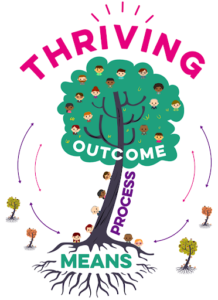A theory of thriving for people living in financial hardship: Findings from a co-production exercise
One of the objectives of The Many Dimensions of Wellbeing project at the Bennett Institute for Public Policy, in collaboration with What Works Centre for Wellbeing, has been to explore how specific groups in society, under specific life circumstances, think about their wellbeing themselves. A related objective has been to explore how they can ‘co’produce’ concepts of wellbeing and the associated metrics in collaboration with policy practitioners and academic experts.
Why did we set these aims? Our value judgments of what it means to ‘live well’ are not static; they can change depending on how our life unfolds. Using both quantitative and qualitative methods, we have demonstrated how coproduction can provide a rich understanding of wellbeing in a particular context. This improves the nuance, sophistication, and sensitivity of wellbeing policy in that area, and helps wellbeing policy to develop from the ‘bottom up’. This is important as policymakers around the UK and elsewhere are increasingly concerned to improve wellbeing, going beyond conventional economic measures of success.
In coproduction, the value-judgements of people with lived experience are put at the centre, but practitioners and technical experts participate with them in a power sharing arrangement that promotes two-way learning. This increases the legitimacy of wellbeing conceptualisations while ensuring that they can also be put into practice in a practical and rigorous way. It democratises wellbeing policymaking while also maintaining high technical standards.
For this co-production project, we ran a series of surveys, interviews, and a workshop with Turn2Us, a national charity that helps people who are struggling financially or at risk of poverty.
Today, Turn2Us and Bennett Institute of Public Policy have launched the report, A Model of Thriving, which summarises the results of the co production process.
We wanted to know what helps people going through adverse life experiences – such as financial hardship – to thrive and not just to survive. We found that people fighting poverty emphasised the following aspects when thinking about what allows them to thrive:
- Satisfying basic material needs
- Overcoming cultural expectations and stigma
- Having freedom and autonomy
- Having strong relationships with friends, family and a community
Interestingly, other aspects they emphasised that were unique to their context were:
- Having advocates and straightforward access to the welfare system
- Avoiding marginalisation and oppression
- Having purpose and being able to contribute to something, rather than pleasure
The iterative co production process allowed our team to organise these and other themes into a ‘theory of thriving’, which now needs to be tested. The theory groups these aspects under three headings: the means, the process and the outcomes (see Figure 1).
- Having means like money, education, health and freedom from discrimination is the most fundamental component.
- Once means are available, we can enter an ongoing process of understanding ourselves and knowing what we want to do in life.
- Finally, as self-knowledge matures, certain outcomes of thriving will emerge. These include being at peace with oneself, autonomy, a sense of purpose and strong positive relationships with others.
Figure 1. A Theory of Thriving

Source: Turn2Us and Bennett Institute of Public Policy (2021), A Model of Thriving.
How can this be tested in research and practice?
We would like to hear from partners, practitioners and decision-makers on how the research findings can be tested and translated into resources that are suitable and practical for different audiences.
- Read and download the report A Model of Thriving.
- Read and download an academic analysis of the co production process.
- Listen to The Many Dimensions of Wellbeing podcast to learn more about the project.
- Learn more about joint decision-making and participatory research approaches.
The Many Dimensions of Wellbeing Project is funded by AHRC and ESRC, and is a collaboration with the What Works Centre for Wellbeing.
